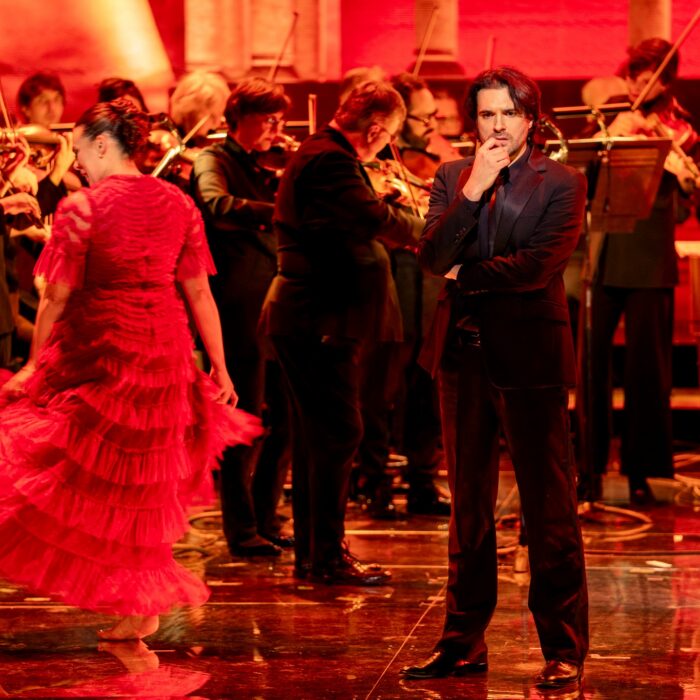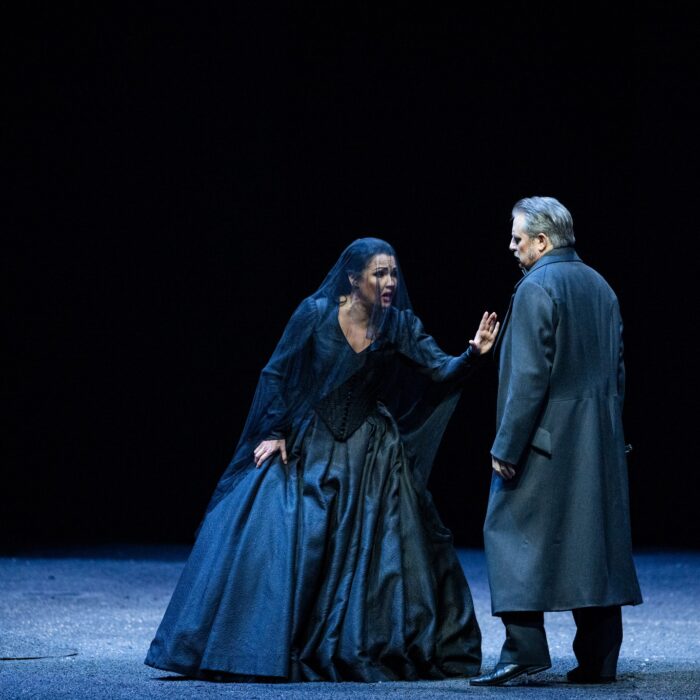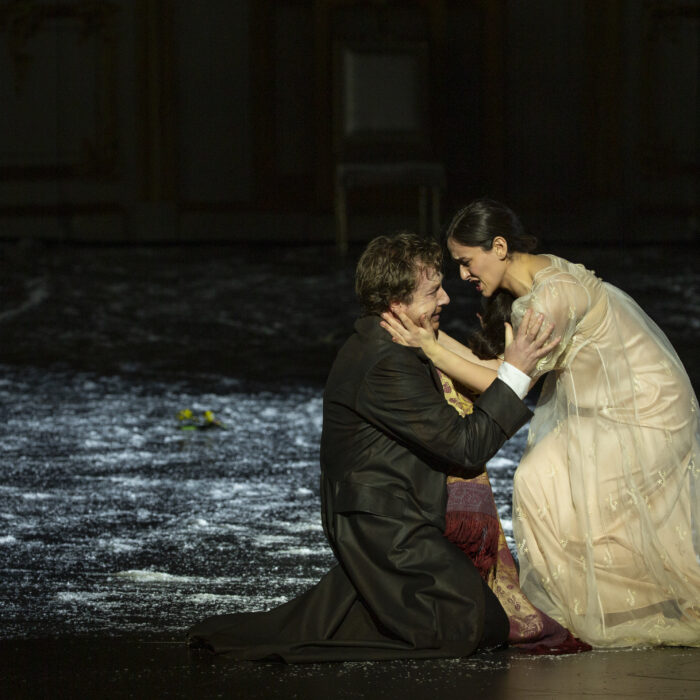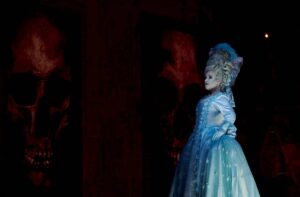
Opernhaus Zürich 2025-26 Review: Der Rosenkavalier
Diana Damrau is a Revelation in New Strauss’ Production Alongside an Extraordinary Cast
By Francisco SalazarOn Sept. 21, 2025, the Opernhaus Zürich opened the 2025-26 season with a new production of “Der Rosenkavalier.”
The season opening was the start of General Director Mattias Schulz’s tenure, and based on this premiere, it is a great start.
Fantasy World
The production by Lydia Steier is a confection of colorful sets that mix time periods and wild fantastical ideas. As Steier said in her director’s statement, the world has its own rules and the logic of a dream.
The first act takes place in a Gottfried Helnwein-inspired yet distinctly late Rococo world of Maria Theresa. The set is a blue wall that changes form throughout the act. We open with a large chamber with a bed on stage left. When the Marschallin is left alone and sings about getting old, the wall is pushed downstage, creating the idea of a woman trapped in the structures of her world. Then, when Octavian returns and the two say goodbye, it turns into a triangle in the center of the stage with images of the Marschallin slowly turning to skulls, further trapping the two and foreshadowing the future. Only when the two accept their fate does the set return to the big hall from the beginning. These transformations felt extremely fluid and never felt like a distraction.
The second act leaps forward to a post-Napoleonic era and takes place in the Faninal family home. There is a large staircase that moves in the scenes between Octavian and Sophie. These scenes almost create the sense that the two are in a dreamlike state as the staircase rotates and the lighting changes to show stars. I was immediately reminded of a Disney-esque scene as time stopped around them.
The third act was perhaps the wildest and most discordant with the rest of the production, as it blended modernity and Rococo. It was a red set with pictures of women that blinked from time to time and eventually turned to skulls and eventually stars. At the end of the stage was a scaffold-like structure that served as a hiding spot for Sophie, for painters and models, and eventually the place where Baron Ochs is handcuffed for some BDSM like behavior. At the end of the opera, the set rose to reveal a red bed, which was pushed downstage to resemble the beginning of the opera. Except the red emphasized a brand new love.
Steier and her team brilliantly use costumes, especially with the Marschallin’s character as she starts with a more flowy dress that emphasizes her youthful qualities, and which she can move about freely. As the act moved on, she would put on layers, emphasizing a little more of the rigidity of the Marshallin. That eventually evolved in the third act as she is in a Rococo-style dress that makes her movement much more rigid, emphasizing her place in the new world. The third act, as noted, is a mixture of wild costumes from policemen and musicians dressed in modern-day clothes, while women police seemed to be dressed in 1930s-40s costumes. It was quite a mix that made the entire scene even more entertaining and unpredictable, and sort of a nightmare like the one that Ochs lives in the act. In a way, the mix of time periods made the entire opera move at a quicker pace because you never knew what else this world was going to bring us.
Other fantastical elements were the man with a rabbit’s head, a man with a duck beak, an old lady who haunts the Marschallin, the nightmare figure on stilts, and the nightmarish apparition of the Italian singer, which scares the Marschallin and remains inside her bed.
That said, the production does not shy away from sexuality. During the opening the Marschallin and Octavian are simulating an oral sexual act, forcing the Marschallin’s attendants to close the curtain to avoid onlookers. The same happens at the end of the opera as Sophie and Octavian begin their relationship in bed. While the first act sees the attendants close a child’s eyes as he enters, a child opens the bed’s curtains at the end of the opera in shock. Baron Och’s famed waltz is also quite sexualized, as he takes Sophie and moves his hand around her body. Baron Och’s drunk soldiers also grab some of Faninal’s attendants during the drunk chorus in very sexual manners. The final act sees Baron Ochs lustfully crawl about a table, moving Mariandel’s hands around his body. As noted, Baron Ochs also handcuffs himself to be whipped by Mariandel.
In all, Steier produced an entertaining and comedic production that was absolutely eye-popping and a joy to discover.
Redefining The Marschallin
In the role of Marschallin, Diana Damrau appeared in her celebrated interpretation. The soprano, who once took on the role of Sophie in her early career, has now graduated to the more lyrical and mature character. It is quite interesting to see Damrau move into this character, as symbolically she has essentially left behind all the roles of her earlier career and is making room for a new generation of singers to take those on. And in a way, it makes her interpretation even stronger.
As she opens the first act, Damrau, dressed in a flowy dress, moved about in a girlish manner, running around the stage, expressing her desire to be young. Her voice was also lighter as she emphasized the German text in the rhythmic qualities of the recit between Octavian and the Marschallin. And in the more lyrical sections of the score, her voice soared with a soft lyric timbre. In her exchanges with Baron Ochs, there was playfulness and coquettishness, and Damrau’s exchanges saw her voice lightened even more even singing a chromatic coloratura line with flexibility. But as her entire court came into create a commotion, Damrau’s Marshallin started to feel haunted. As the Italian tenor sang his aria, she looked distressed, and one could sense her fear. She ran to close the bed curtain and make the ghost-like figure disappear.
When she sang the lines, “Mein lieber Hippolyte,” remarking about looking older, Damrau sang with a nostalgic quality; you could sense her torment. That was all the more evident in her aria “Da geht er hin, der aufgeblasne, schlechte Kerl,” where Damrau gave a heartbreaking account. Her voice soared with gorgeous legato lines and beautiful, floated pianissimi. One sensed a Marschallin who was holding back the tears as she delivered each line. The ensuing duet with Octavian was equally wrenching, especially in the “Die Zeit, die ist ein sonderbar Ding.” Here, the soprano had a fuller and richer middle voice. The lower notes were also weightier, and the legato lines were connected with impeccable phrasing. As the duet ended, Damrau’s voice slowly decrescendoed with a sound that sometimes felt like a whisper. You could sense her despair at the decision to leave her Octavian.
In Act three, all the youthful energy disappeared, and she returned as a regal princess who had accepted her fate. Damrau’s vocal delivery had grace and poise as well as authority. As she looked at Angela Brower’s Octavian, you could sense the nostalgia and yearning for her lover. That was all the more present in the trio “Hab’ mir’s gelobt, ihn lieb zu haben,” where Damrau sang with a lush timbre that emphasized her longing. The middle voice resonated with a silvery tone and a gorgeously connected legato. The three voices sang in unison, with neither ever covering the others. It was a visceral moment, and given all the character work that Damrau gave us in Act one, it was hard not to feel for this Marschallin. Her final lines, however, gave us a sense that this Marschallin would be all right.
Youtful Growth
In the role of Octavian, Angela Brower was a delight, bringing out many layers to her character. At the beginning, you could see a young boy enthralled, excited, and stricken with his Marschallin. There is a combination of sexual desire, but also care and love, especially in the first scene, as Brower’s first lines were embellished with a strong and lush mezzo. In her first interactions with Baron Ochs, Brower showed her Mariandel a bit scared of Ochs running from him and started to create a nasal sound that she would eventually champion in the third act to incredible use. During her interactions with Damrau’s Marschallin, she would mock Ochs with a simple look or simply act confused as to what Damrau’s Marschallin was planning. That demonstrated an innocent young man who Brower would expertly evolve throughout the following acts. In their concluding duet at the end of the act, Brower really conveyed sorrow and confusion through her phrases, singing with a warm sound. As the line grew in the music, so did Brower’s voice, showcasing desperation.
In Act two, Brower entered the scene with the rose, completely distraught and uninterested. Even as he gave the rose to Sophie, Brower remained aloof. It was only when Sophie’s lines rose to a high note that Brower’s Octavian saw something in Emily Pogorelc’s Sophie. There, the two sang the Presentation of the Rose with vivid expression. You sensed that this love was sincere. In this act, you could finally also sense a maturity in Octavian as Brower gained some strength in front of Ochs and confronted him with a fierce and plush mezzo voice.
In Act three, as noted, Brower relied on the nasal falsetto voice to shape Mariandel’s character, and Brower clearly enjoyed the entire game as she threw herself into every movement in a mocking fashion. Her repetition of “Nein Nein” was incredibly funny and varied in color. She even enjoyed whipping Baron Ochs. There was a moment where she did lose control as Ochs slid her around the stage in a chair before grabbing her by her legs. Brower eventually used that moment to stand on Günther Groissböck.
Once the game was over and the Marschallin arrived, Brower showcased emotional confusion. The voice returned to its warm timbre, emoting delicacy as she attempted to find a balance in her character’s emotions between Sophie and the Marschallin. She sang with a gorgeous piano that evoked Octavian’s torment. But that all transformed in the final trio and duet as the voice returned to the youthful quality from the beginning.
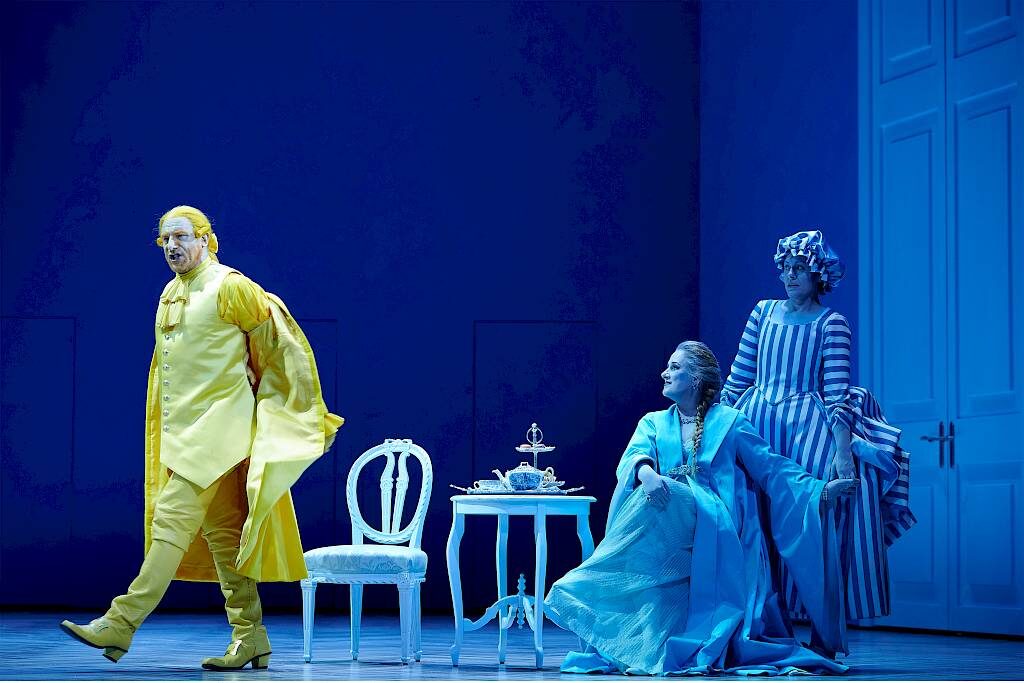
Matthias Baus
A Master
Günther Groissböck brought his signature Baron Ochs to Zürich, and while the first act did see him have some grainy and dry moments in his voice, he truly showed why he is the Ochs of our time.
In the first act, he pushed the limits of his character with buffoon-like qualities, moving about the stage, attempting to grope Mariandel, from trying to force her to dance, to grabbing her by the legs. He also used his voice with exaggeration, at one point using an almost falsetto voice on a high note and holding it out as much as he could. The exaggeration was hilarious as Damrau and Brower looked at one another, ridiculing him. Then there were moments when he would use his booming voice to attempt to acquire authority. There was the waltz, where he started to dance to the melody, and then there was the playfulness of power between him and Damrau. It was unpredictable, and it kept the scene going. More fascinating was his use of the text and the pattern-like rhythm. Groissböck never wavered in his intonation, even when the voice sometimes lost some of its luster.
In Act two, Groissböck commanded the scene with his harshness toward Sophie, dancing the waltz in a very sexual way, almost groping her as noted above, and later exaggerating his injury. His “Da lieg ich” was commanding as the bass-baritone brought out many colors from a soft middle voice to a booming bass-baritone and some resonating low notes like his low E. At times it felt ominous, and at times you couldn’t help but laugh. What made the scene work was how seriously Groissböck made his Ochs look. And that made the comedy even richer.
Groissböck’s physicality was nonstop in Act three as he threw himself at Mariandel in every way, crawling on a table, lying on the floor, and then putting his legs on top of her. Then, at one point, as noted, he was handcuffed to a scaffold. He did all of that while singing some magnificent rhythmic lines with such precision and attention to his impeccable diction.
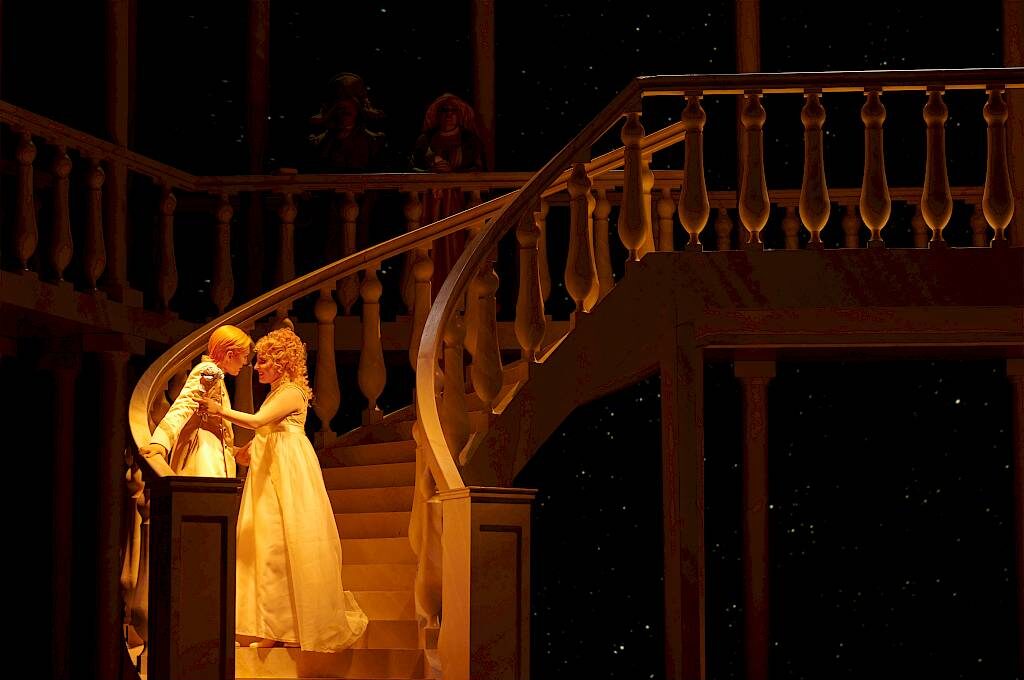
Matthias Baus
Youthful Strength
Emily Pogorelc delivered an unusually feisty and gutsy account as Sophie. The moment she walked on stage, you could sense an incredible amount of energy that she sustained throughout the performance. She could be innocent and in love, but at other times, she could easily show a stronger side to her character as she did, delivering a monologue after the Presentation of the Rose, where she dug into her chest voice with some grit. In her confrontation with her father Faninal, you could sense Pogorelc wasn’t afraid to ask her father anything. And in Act three, she was in on the plan to trick Baron Ochs, playing along with Octavian, and being in on everything happening. You could sense Sophie having fun with the entire scheme, and that made her character even more dynamic when she discovered that Octavian still had feelings for the Marschallin. Pogorelc allowed us to feel her journey as an innocent, strong character who could quickly give in to her emotions. Her voice was filled with vibrant tones, especially as she reached her higher notes, and her delivery of the German recitatives was precise with impeccable diction. Her duets with Angela Brower’s Octavian in Act two were the vocal highlights of her evening as the voice rang in the hall and soared over Strauss’ immense score. It also helped that the two voices blended gorgeously together and created ethereal moments. In Act three, upon discovering that Octavian had feelings for the Marschallin, Pogorelc unveiled a new layer to her Sophie, the young and frail one that perhaps was not seen throughout. The voice obtained a shimmering frailty that perhaps was missing in the beginning, and in the trio shimmered with delicacy even as she rose to the highs. In the final duet with Octavian, “Ist ein Traum,” there was some trepidation in her higher notes, but she blended with Brower’s voice beautifully.
In the role of Faninal, Bo Skovhus sang with a warm baritone that imbued the elderly qualities of his character. There were some moments of authority, especially as Sophie asked not to marry her off to Ochs, and then there were moments at the end of the second act, where it was clear that Skovhus’ Faninal had no power or control of the situation. That was most clear as he entered the third act with control, showing a sonorous tone as he reproached Ochs, but slowly weakening and fainting as the voice took on an airy quality. His final lines with the Marschallin brought back his softness in character with a rich baritone as he walked out, Damrau gently taking her hand.
In the role of the Italian Tenor, Omer Kobiljak sang with a clear timbre that showed a vibrant and plush top. Nathan Haller and Irène Friedli, as Valzacchi and Annina, enjoyed themselves in their character, with Friedli especially relishing her moments as she flirted with Ochs and later mocked him in the third act. There was also a scene at the end of the second act where she was sexually molested by Baron Ochs’ men, and that made her third act scene even stronger, as it was clear she was getting vengeance for the mistreatment.
Rebeca Olvera as Eine Modistin, showed a lyrical sound in her second act exchanges, while Stanislav Vorobyov as the police head was commanding.
In the pit, Joana Mallwitz led an extraordinary reading of the score, emphasizing the complex orchestration of Strauss; music. Her opening prelude to Act three was especially thrilling as you could hear the playfulness in Strauss’ music as well as the commotion that was about to take place. She also had a great balance with most of the passages where Strauss’ music soars, trying to never cover up the singers, even if sometimes it did happen. Still, she led the score with incredible forward momentum, and it never felt like the opera dragged. Highlights included the elegant waltz in Act two as well as the presentation of the rose, which showed the ethereal colors in the score coupled gorgeously with the singers. The final violin solo in Act one was also lush and expressive.
In all, this was an evening to remember with a cast that will be hard to top.
